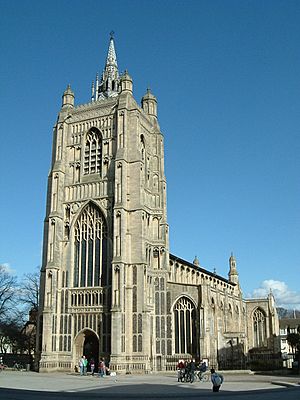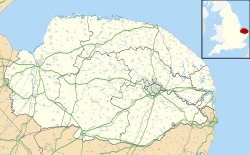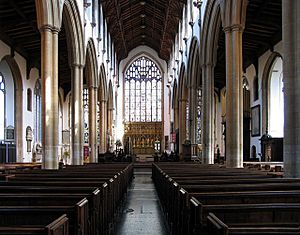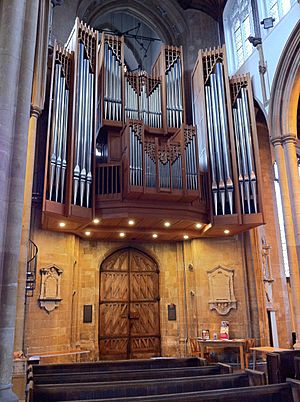St Peter Mancroft facts for kids
Quick facts for kids St Peter Mancroft, Norwich |
|
|---|---|
 |
|
| 52°37′40″N 1°17′33″E / 52.62778°N 1.29250°E | |
| Country | United Kingdom |
| Denomination | Church of England |
| Churchmanship | Central |
| Website | www.stpetermancroft.org.uk |
| History | |
| Dedication | Saint Peter |
| Administration | |
| Parish | Norwich, St Peter Mancroft |
| Diocese | Norwich |
| Province | Canterbury |
St Peter Mancroft is a parish church in the Church of England in the centre of Norwich, Norfolk. After the two cathedrals, it is the largest church in Norwich. It was originally established by Ralph de Gael, Earl of East Anglia, between 1066 and 1075. It was later rebuilt, between 1430 and 1455. It stands on a slightly elevated position, next to the market place.
St Peter Mancroft is a member of the Greater Churches Group.
Description
The present building was begun in 1430 on the site of an existing church, and consecrated in 1455. It is 180 feet long and ashlar faced with a tower at the west end. It is a Grade I listed building.
It has a Norman foundation dating from 1075, a 1463 font, a 1573 Flemish tapestry and medieval glass. The North transept displays a collection of church silver, including the Gleane and Thistle cups, as well as memorabilia associated with the physician-philosopher Thomas Browne, author of Religio Medici (1642). George Edmund Street published an exhaustive study of the church in 1879, and in 1896 a small lead-covered spire with flying buttresses was added, designed by his son A. E. Street.
In 1850 two L-shaped trenches accommodating a number of acoustic jars were discovered beneath the wooden floor on which the choir stalls had previously stood. The earthenware jars were built into its walls at intervals of about three feet, with the mouths facing into the trenches.
Incumbents
- Hugh Casselton 1572 - 1588
- William Wells 1598 - 1620
- John Brereton 1620 - 1632
- Thomas Tenison 1670 - 1680
- John Connould 1683 - 1708
- John Jeffrery 1714 - 1723
- Charles John Chapman 1805 - 1826
- John Watson Bowman 1826 - 1848
- Charles Turner 1848 - 1878
- Sidney Pelham 1879 - 1881
- Henry Neville 1881 - 1884
- Frederick Baggalley 1884 - 1890
- William Pelham-Burn 1890 - 1901
- Frederick James Meyrick 1901 - 1929
- Hugh McMullan 1929 - 1940
- Vacant 1940 - 1945
- John Waddington 1945 - 1958
- Kenneth Wilkinson Riddle 1959 - 1960
- Frank Sydney Jarvis 1960 - 1965
- William John Westwood 1965 - 1975
- David Sharp 1975 - 1998
- Peter W Nokes 1999 - 2015
- Robert Avery 2015 - 2017
- Ian Bentley 2017 - 2018
- Edward Carter 2018 – present
Organ
A new organ by Peter Collins was installed in 1984. The specification can be found on the National Pipe Organ Register.
Organists
- William Pleasants 1708 - 1717 (son of Thomas Pleasants, organist of Norwich Cathedral)
- Humphrey Cotton 1717 - 1720 (afterwards organist of Norwich Cathedral)
- George Baker 1720 - ????
- Samuel Cook ???? - 1780
- Edward Beckwith 1780 - 1793 (acting organist from 1769)
- John Christmas Beckwith 1794 - 1808 (afterwards organist of Norwich Cathedral)
- John Charles Beckwith 1809 - 1819 (son of the above)
- Alfred Pettet 1819 - 1837
- Samuel Critchfield, Junior 1837 - 1851
- James Harcourt 1851 - 1877 (afterwards organist of Wymondham Abbey 1880 - 1881)
- Edward Bunnett 1877 - 1908
- Richard John Maddern-Williams, F.R.C.O 1908 - 1922 (formerly assistant at Wells Cathedral)
- Frank Edward Newman 1922 - 1926
- Richard John Maddern-Williams, F.R.C.O 1926 - 1941
- Charles Joseph Romaine Coleman 1942 - 1959 (and jointly assistant organist at Norwich Cathedral)
- Kenneth Ryder 1963 - 2005
- Matthew Pitts 2006 - 2009
- Julian Haggett 2009–present
Assistant organists
- Charles Robert Palmer 1899 - 1901
- W. Percy Jones 1910 - ca. 1921 - ????
- Andrew Benians
- Roger Rayner
- Tim Patient 1990 - 2005




